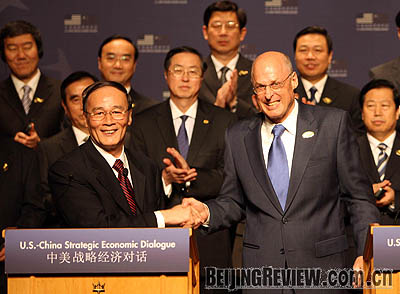|

TALKING ON: Chinese Vice Premier Wang Qishan (left) co-chairs the fourth round of the China-U.S. Strategic Economic Dialogue with U.S. Treasury Secretary Henry Paulson in Annapolis, Maryland, on June 17
China and the United States ponder their future at the Strategic Economic Dialogue
Everything is different now. In light of the recent changes in the global economic landscape, Chinese and U.S. officials had new thoughts about their relationship in mind as they began their fourth Strategic Economic Dialogue (SED) on June 17 in Annapolis, Maryland.
"In the past, China hoped to draw on America's experience in macroeconomic regulation through the discussions," said Zhou Xiaochuan, Governor of the People's Bank of China, the country's central bank, at a news briefing. "This time, it is not only interested in that, but also eager to learn a lesson from the Americans' setbacks."
Visiting Chinese Vice Premier Wang Qishan and U.S. Treasury Secretary Henry Paulson co-chaired the meeting as special representatives of the two countries' heads of state. Wang, former Mayor of Beijing, took over the reins from Wu Yi, who retired earlier this year. Participants in the two-day talks included ministerial-level officials and other senior officials from the two governments.
Their discussions focused on five specific areas: finance and macroeconomic management, developing and protecting human capital, the benefits of trade and open markets, enhancing investment and advancing joint opportunities for cooperation in the fields of energy and the environment.
Given the global implications of the U.S. economic slowdown and the depreciation of the dollar, Chinese experts argue that it is time for China to urge the United States to shoulder its international responsibilities. Both Chinese and U.S. experts believe high-level economic dialogues will continue after the Bush administration finishes its term early next year.
China's calls
"While the United States demanded that China allow its currency to appreciate and open up its financial markets in the previous rounds of the SED, China called on the United States to be a responsible world financial power in the fourth round," said Zhou Shijian, a senior research fellow at the Research Center for China-U.S. Relations at Tsinghua University. He believes the United States should strengthen its financial regulations to address the aftermath of the subprime mortgage crisis. The negative effects of this crisis have reverberated beyond the United States to Europe, Japan, India and China, he said.
Also, the weak dollar is one of the major causes of worldwide inflation today, Zhou said. The United States should be aware that the stability of its currency is conducive to the stability of the U.S. economy and the world economy at large, he said.
The U.S. investment climate is also on Zhou's list of concerns. While America's investment in China far exceeds China's investment in the United States, Chinese investors face various restrictions as they seek to penetrate the U.S. market, he said.
Efforts to assess the U.S. subprime mortgage crisis and its impact as well as to strengthen the coordination between China and the United States on macroeconomic and financial policies are conducive to the economic and financial stability of the two countries and the world, Wang said during the talks.
China has made solid progress in opening up its financial sector, protecting intellectual property, improving product quality and food safety, reforming the exchange rate regime of its currency and reducing its trade surplus with the United States, Wang said. But it takes time to solve certain problems, given China's national conditions, global industrial relocations and divisions and the international monetary system, he said. He hoped the United States could attach great importance to China's concerns, he added.
"We have encouraged China to play a vigorous role in the global economy and in multilateral conversations and to participate in everything more proactively," Paulson said.
Zhou called on the United States to show some concern for China's current difficulties. China was hit by heavy snowstorms early this year, then devastated by the Wenchuan earthquake in May and now suffers severe flooding in the south. Economists have predicted a drop in China's economic growth rate this year. In this context, it is unreasonable for the United States to mount pressure on China, he said.
The yuan's appreciation has already hammered China's exporters, as evidenced by the drastic decrease in the quarterly growth of Chinese exports to the United States since the beginning of last year, he said.
Partnership and Mechanism
China and the United States signed a 10-year cooperation framework on energy and environmental protection at the end of the SED. In an article published in the North American edition of The Financial Times on June 16, Wang underlined the need for China and United States to work together in the fields of energy and the environment.
"Stronger cooperation between the two countries in energy and the environment will enable China to respond better to energy and environmental issues and also bring about tremendous business opportunities and handsome returns for American investors," Wang wrote in the article.
| 